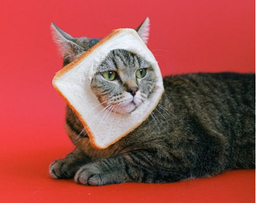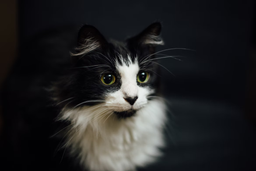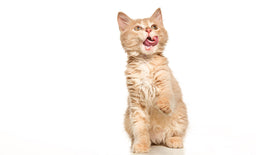Untamed—high-protein cat food that lives up to that label
The basis of healthy feline nutrition is protein, but not any kind—our furry friends’ organisms are designed to digest and absorb animal-based protein. Unfortunately, most commercial food options labelled as high-protein cat food are all but that. They fail to provide enough precious nutrients to our cats, opening the door to potential health problems.
You might ask yourself, “what should my cat eat, then?” Before we get to particular food options, let’s find out:
- What makes high-protein cat food the best choice for our feline friends
- Whether there are consequences of protein deficiency
- What to keep in mind while shopping for high-protein cat food
- Whether cats need to eat only foods that are high in protein
How much protein should a high-protein diet for cats have?
Cats need a lot of protein to keep that elegant figure in motion—50% and above of daily intake, to be exact.
A cat’s need for this particular nutrient starts as soon as they are born. Kittens start off with a high-protein intake thanks to the milk of a nursing cat, which contains the perfect amount of protein, fat, and other essential nutrients. Thanks to its contents, the queen’s milk helps kittens grow super fast. If you’re fostering a kitten, you will have to rely on a syringe or bottle and formula with at least 35% of crude protein and 40% of crude fat per meal.
If the protein content in your cat’s food exceeds the recommended percentage, it’s no big deal as your cat’s organism will break the nutrient down and eliminate it through urine. A lack of protein in your cat’s diet, though, can cause a lot of trouble.
The impawtance of high-protein cat food
What’s all the hiss about protein, anyway? This nutrient plays a significant role in:
- Growing and repairing tissue
- Forming building blocks for your furry friend’s:
- Tendons
- Coat
- Muscles
- Blood
- Regulating your cat’s metabolism
Another benefit of high-protein cat food is that it helps cats on a feeding frenzy cut down calories without leaving them hungry.

Untamed cats have the most fabulous coats. P.S. You can, too!
Image (c) Untamed
Protein consists of amino acids, which are building blocks for most essential processes in your cat’s organism. Some of the most crucial amino acids for cats are:
- Taurine—The lack of this amino acid allows for eye degeneration, heart problems, and abnormal growth
- Arginine—Insufficient amounts of this amino acid can manifest as an accumulation of ammonia in the feline’s body, which can lead to seizures and even death
Prolonged amino acid deficiencies could lead to poor growth, congenital defects, reproductive problems, and a malfunctioning immune system.
Keep in mind that high-protein cat food isn’t effective without other essential nutrients, such as vitamins, minerals, a tiny bit of carbohydrates, and enough fat to keep your kitty up and running. Signs that your cat might not be getting the nutrients they need are:
- Rejecting food
- Lacking energy
- Nibbling on grass
Pros and cons to different types of high-protein cat food
To properly start your weaning kitten with a high-protein diet or switch your adult cat to food with a higher content of this valuable nutrient, you should know your options—which are:
- Wet food
- Dry food
- Raw food
While the type of food is a matter of each cat parent’s choice, you should know the characteristics of all types to make an informed decision.
High-protein wet cat food=low chance of health problems
The benefit of wet food is that it contains the right amount of moisture necessary to keep your kitty hydrated without overloading their organism with sugar, salt, and other ingredients a cat’s stomach isn’t designed to process but that are often contained in commercial cat foods.
Unfortunately, even if you opt for wet food, many brands don’t provide the transparency and ingredient details you look for as a caring cat parent.
Untamed saw the lack of quality high-protein options on the market and decided to create a better alternative for our beloved felines—one that doesn’t compromise their health but helps them live their best cat life instead. Try our high-protein cat food now and watch your kitty thrive!

Clucking our way into your hearts, one tin at a time!
Image (c) Untamed
Is high-protein dry cat food any good for your cat?
Many kitties and cat parents alike prefer dry food because it’s:
- More affordable
- Easier to store
- Not as quick to spoil
Some cats even prefer the taste and texture of dry food over wet options. With all those benefits in mind, you should avoid a dry-food-only diet and strive for diversity because dry food contains only 10% of moisture (which is significantly less than the 75–78% moisture wet food has). Sometimes, kitties who eat a lot of dry food aren’t aware that they should drink more water (they should get a lot of moisture from their food), and that can lead to dehydration.
Dehydration causes problems no cat parent wants to go through with their loyal companion, such as:
- Urinary tract infections
- Urinary stones
- Chronic kidney disease
- Kidney failure
The main takeaway is that dry food isn’t bad and has its benefits, but an ideal feline diet should consist of both wet and dry options.
What about cats on a raw diet?
Some vets and specialists argue that a raw diet for cats allows for better protein digestibility. Before offering your feline raw chicken, you should keep in mind that:
- Raw diet doesn’t work for every cat
- Cat who switches to a raw diet in adulthood can experience severe allergies
- Raw cat diet increases the risk of contamination with salmonella and Escherichia coli, which requires you to prepare and serve the food in a sterile environment
If you want to introduce a raw diet to your cat, you should consult your vet beforehand. The vet will run some tests to see whether this type of diet is suitable for your cat and, if so, provide advice on meal preparation and storage.
Proper portioning of high-protein cat food
Is your kitty not letting you sleep and causing a stir at 3 a.m.? Meowing in your face first thing in the morning, as to say “FEED ME, HUMAN”? It may be time to question whether your feline is eating enough if they are showing some of the following signs:
- Weight loss
- High-pitch vocalisation near the food bowl, or wherever you are, only to lead you to the food bowl
- Fur became rougher and lost its shine
- Lack of energy
Determining the required caloric intake of your cat can be challenging, as it depends on your feline’s:
- Age
- Weight
- Health
If you’re struggling to determine how much your furry friend should eat, let’s do it together:
|
Weight in kilos |
Neutered or spayed cats |
Intact cats |
Cats prone to obesity |
Overweight cats |
Nursing or pregnant |
|
2–3 |
160 kcal |
180 kcal |
130 kcal |
105 kcal |
330 kcal |
|
4–5 |
260 kcal |
300 kcal |
175 kcal |
140 kcal |
470 kcal |
|
6–7 |
350 kcal |
410 kcal |
295 kcal |
235 kcal |
850 kcal |
|
9–10 |
440 kcal |
510 kcal |
370 kcal |
295 kcal |
1090 kcal |
More active cats may require a meal or two more, so keep an out for any of the already mentioned signs that your cat might still be hungry.

Look out for flying plants after that extra protein energy!
Image (c) Untamed
Looking for the best high-protein cat diet? We’ve got your back!
By picking the best whole meat cuts and fish carefully, Untamed guarantees your feline won’t lack protein or any other essential nutrient. Among our recipes, you will find something for every cat’s taste, including:
- Chicken
- Mackerel
- Ham
- Sardine
- Tuna
- Salmon
- Duck
- Shrimp
Our gravy and jelly recipes satisfy every cat’s belly, even those of finicky and fussy felines! If you think your cat is a tough nut to crack, we dare you to get your paws on our trial box!

Untamed gets to the meat of the matter, every time.
Image (c) Untamed
High-protein cat food that’s yum-yum for a sensitive tum-tum
Is your cat struggling with inconsistent bowel activity? Most of the time, the causes behind a cat’s nervous belly are hard-to-digest animal derivatives, coarse grains, artificial taste enhancers, and chemical preservatives found in commercial cat food products. If your cat has a sensitive tummy, they need food with whole meat and organs that preserves the essence of their natural diet and recalibrates a stressed digestive system.
Does your cat struggle with frequent tummy troubles? Don’t fret because Untamed offers products made with the best cuts of human-grade whole meat and organs. We rely on natural ingredients to make our food suitable for all felines. A consistent Untamed diet can stabilise the feline digestive system over time.

Our Chocka Chicken recipe is paw-licking good!
Image (c) Untamed
Hypoallergenic and high-protein cat food? Say no more!
Are you struggling to find hypoallergenic cat food rich in protein and flavour? You can kiss common allergens goodbye once you switch to Untamed. Our meticulously chosen ingredients go through the minimum amount of processing to ensure they stay exactly the way they should be—nutritious, delicious, and with no shady or harmful extras. If your cat suffers from extreme allergies, try our hypoallergenic and utterly delicious Chocka Chicken and Tuck-in Tuna meals tailored to the needs of felines with extra-sensitive tummies!
We believe in transparency
Members of the Untamed pack know what they are feeding their furry friends—our cat food contains:
- Two times more protein than the industry standard
- Best human-grade meats and fish
- No additives, artificial colouring or flavouring, and other nasty chemicals
Every Untamed meal is packaged right after preparation, keeping all the natural ingredients and flavouring.
Convenience is a cat parent’s best friend
Cooking for your feline friend can take up a lot of time. That’s why we provide meals that help you save time without compromising the ingredients’ nutritional value. Untamed portions do not require:
- Thawing—Our recipes come ready for serving
- Additional cooking—We gently steam our ingredients, so you have more time for your furry friend
Let your cat be the final judge
Your cat has the final say. Complete our quiz and order our high-protein canned cat food online—you'll receive a trial box of 12 meals your kitty can check out. One-time payment, no commitment, delivered in sustainable packaging. We wouldn’t feed junk food to our own cats, and we won’t harm Mother Nature, either.
The high-protein cat food your feline deserves—delivered to your doorstep
Untamed was created to prevent cats from suffering the consequences of a poorly formulated diet. We love our cats, and feeding them anything that’s not premium quality is not an option. If you want only the best for your furry friend, here’s what you should do:
- Visit our Try Now page
- Tell us about your cat’s:
- Name
- Life stage
- Food preferences
- Order a trial pack
Your order will be delivered in a day. If your cat wants more of Untamed, we will send you monthly supplies at the best rate—our shipping is always free! Our cat food service supports your changing requirements—you can modify, postpone, pause, or skip an order anytime, no questions asked.
Watch your cat flourish with a nutritious, protein-packed diet
Your feline should show progress right after they switch to a high-protein whole meat diet. After trying Untamed, most of our pack members report the following:
|
What happens after... |
Day one |
Two months |
Four months |
Furever |
|
Signs of improvement |
Say bye to nervous bowels and hi to less mess—litterally |
Get your game on because playtime gets a whole new meaning! The high-protein diet consisting of whole meats will give your cat a significant energy boost |
Prepare yourself for the best cuddles ever. Your cat’s coat will reach an all-time high in softness and show its true colours |
Enjoy the extra purrs and cuddles your happy kitty will give you as a result of the easy weight management and other health benefits |
The vet is your best ally when establishing a high-protein cat diet
If you need a little extra help in determining your cat’s nutritional needs, a vet can always help you out. Regular vet visits ensure that you’re not under- or overfeeding your cat and that they are getting the right amount of nutrients at all times.
If you’re absolutely sure that your kitty is eating enough, a vet can help determine any underlying conditions that are making your furry friend cry for more food, such as:
- Intestinal problems
- Diabetes
- Hyperthyroidism
Potential red flags in cat food
In order to provide your feline a quality life, you must know about ingredients that can cause harm to your furry friend. Let’s take a closer look at some of those ingredients and the consequences they can have on a sensitive feline organism:
- Grain fillers
- Vegetable derivatives
- Glucose and dextrose
- Artificial flavouring, colouring, and other chemicals
Grain fillers
Cats can consume grain in moderation since fibre promotes healthy digestion. Unfortunately, many brands stuff their food with grain fillers that make cats feel full while not providing any significant nutritional benefits. The most common grain fillers used for cat food are corn, wheat, and rice.
Vegetable derivatives
This term is used to describe anything that isn't cereal but mostly refers to material leftover from the human food industry. Vegetable derivatives are typically prepared on high heat, depriving them of any nutritional value and making them only another fibre source. Even the healthiest veggies are useless for cats because felines cannot digest them.
Glucose and dextrose
Cat’s don’t need sugar in their diet, nor can they taste it. Still, many brands stuff their products with sugar—like glucose and dextrose—to improve the texture and colour of kibbles. Sugar is a cheap filler in cat food that can potentially cause obesity and diabetes. Some nutritionists believe it also causes addiction to dry food, making kitties unwilling to change to higher quality wet food later on.
Artificial flavouring, colouring, and other chemicals
The following substances you can typically find in commercial cat foods could be carcinogens:
- Butylated Hydroxyanisole (BHA)
- Butylated Hydroxytoluene (BHT)
- Ethoxyquin (banned for human consumption)
- 4-methylimidazole (4-MIE), found in caramel colouring
- Carrageenan and carrageenan gum (could transform into its degraded form when mixed with acidic stomach fluids of felines and become a carcinogen)
Foods to keep out of sight and paw’s reach
Contrary to popular belief and the cartoons we watched as kids, milk and other dairy products, such as cheese and cream, are not suitable for a feline digestive system, but these are not the only problematic foods. Our furry companions also have a hard time processing the following:
|
Foods |
Consequences |
|
Potentially fatal |
|
Gastrointestinal problems such as:
|
|
Urinary problems |
|
Seeds and skin of:
|
Respiratory issues and shock due to cyanide poisoning |
Should your cat eat only high-protein cat food?
Your cat’s diet should be based on high amounts of animal protein, but you can treat your kitty to something else every now and then. Some of the natural treats your furry friend might enjoy in tiny amounts are:
- Berries
- Strawberries
- Blueberries
- Blackberries
- Raspberries
- Bananas
- Cucumbers
- Apples (without the skin, stem, and seeds)
- Cooked eggs (super-rich in protein, but be wary of its high fat content)

The face of despair when your human starts feeding you all sorts of crazy foods. I was doing just fine with meat, thank you!
Image (c) Untamed

![Best food for Ragdoll cats in the UK [Broken Down]](http://untamed.com/cdn/shop/articles/featured_best_food_for_ragdoll_cats_uk.jpg?v=1646818249&width=256)

